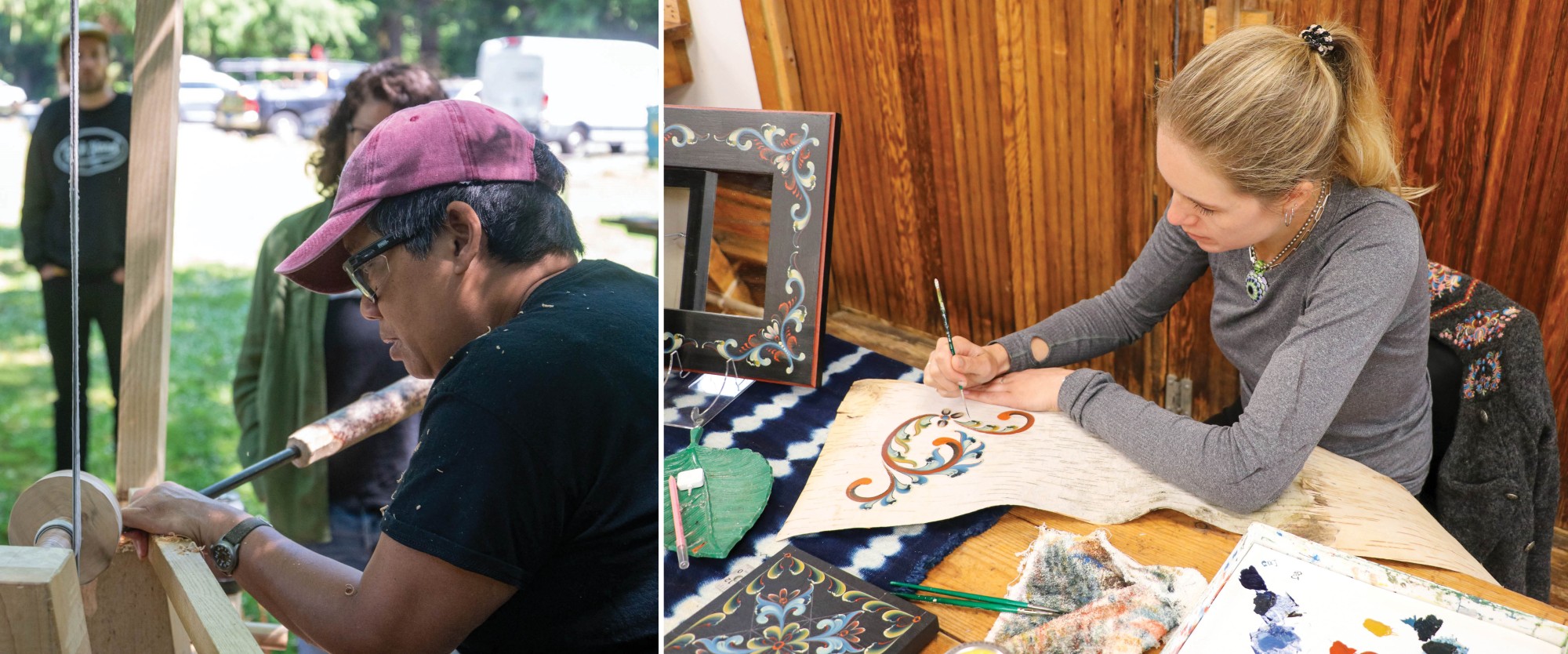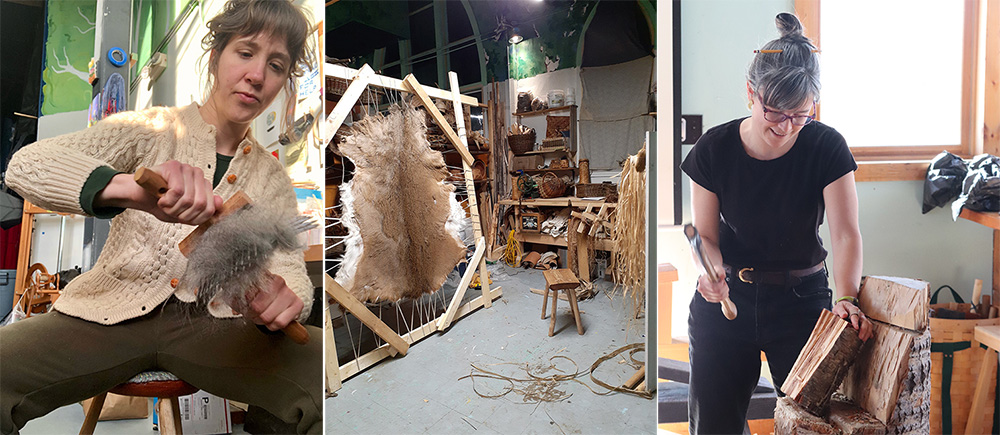
The Artisan Development Program nurtures the growth of the next generation of traditional craft artisans. The program offers professional development including mentorship, education practice, studio space and time for artisans committed to pursuing craft education as a professional pathway. Resident Artisans in the program build in-depth experience in their craft, while enhancing the vitality of North House Folk School as craft ambassadors for the school. Participants cultivate meaningful relationships, develop craft and teaching skills for future leadership, and forge connections with regional, national and international institutions and artisans.
The program of study for artisans includes the following:
- Craft Study — Engagement with professional mentors, dedicated studio space, budget for mentorship, materials, and tools, training in professional practice and entrepreneurial skills
- Teaching Skill Development — Assisting instructors in courses at North House, independent teaching at North House, participating in professional development
- Public Engagement — Regional travel to build professional networks, represent North House, as well as demonstrating craft and representing the program on campus.
- International Connections — Assisting in creating opportunities for international instructors to visit and teach at North House; travel on a learning journey to Scandinavia
Program History 2017 - Today
This program has evolved significantly from past years in order to increase the number of participants and make it more possible for people from a diverse array of situations to participate. Of particular note, the two year program no longer requires residency in Grand Marais for the full two years. Housing and studio space is provided in Grand Marais during the first immersion year of the program; during the second independent study year of the program, participants are offered support to pursue their learning goals in a location of their choosing. In both phases, living in proximity to North House is highly recommended as there are significant benefits to being part of the day-to-day happenings of a thriving folk school community.
Who should apply?
This program is designed for craft artisans and makers with four or more years working in their craft medium who already have some experience teaching and showing their work. Resident Artisans focus in one or more areas of craft with current available core areas for focus being: fibers (felting, spinning, weaving, knitting), basketry, leatherwork, wood (turning, timber framing, boat building, carving, building), and foods. Other areas of emerging interest to the Folk School may be proposed, provided that they have a strong connection to traditional northern craft.
The program is designed to benefit emerging craft artisans by providing them with a supportive environment to hone their skills, develop their voices as makers and teachers of craft, and steep themselves in what it means to make a life and a living in the world of traditional craft. Past residents have used their time in the program to take their work in new directions, develop and deepen connections with master craftspeople as mentors, create foundations for craft entrepreneurship, and expand their horizons as educators.
This program is largely geared towards US citizens and legal permanent residents because they have easy legal ability to complete the following program requirements: 1) ability to be in the United States for two years continuously, 2) receive income 3) travel internationally to Scandinavia and 4) have an ongoing relationship with North House in the future. Please note, North House is not an accredited educational institution through which you could apply for a student visa, and we cannot help you obtain a visa to participate in this program. If you are not a US citizen or legal permanent resident and you believe that you can still accomplish the above requirements, you're welcome to apply.
Current and former "ADP" participants are listed further down on this page.
Benefits to Resident Artisans
This program includes two distinct phases, each approximately one year in duration. In Year 1, Sept-July – the Immersion Year – participants are actively engaged in required structured activities at or with North House for ~50% of their time. This includes training in teaching practice, entrepreneurship, and professional practice, as well as two regional learning journeys and one international journey to Scandinavia. The remaining time is available for self-guided studio practice, mentorship, and travel. In Year 1, furnished lodging is provided in a house shared with other Resident Artisans. Each Resident Artisan has their own bedroom. Kitchen, bathrooms, living room, and dining room are shared. Studio spaces are semi-private in a large sunny historic building just blocks from the main North House campus. Studios are empty and are to be outfitted fully by each participating resident.
In Year 2, August-June – the Independent Study year – participants are offered many opportunities for paid work including teaching, demonstrating, and other roles as well as a tuition stipend for coursework at North House. In both years, funding for professional development and mentorship is provided.
Watch a PBS Segment from the show Making It Up North about the Artisan Development Program
Current Resident Artisans
Cohort IX
Josie Cooke

Josie (she/her) is a weaver, focused on creating locally sourced, ecologically friendly, ethically produced textiles. She enjoys creating everything from finely woven dinner napkins to chunky wool rugs. During her time in ADP, she plans to weave cloth for garments in line with the ethos of the Slow Fashion movement, recreate historical archeological pieces, and produce textiles for the home. Josie believes traditional crafts provide a connection to the feeling of a life well lived, and teaches regularly to share this joy with others. She looks forward to connecting with fellow craftspeople and students in her journey.
Jake Fee

Jake Fee is a maker of toys, games, puzzles, doohickeys, doodads, dongles, and thingamajigs. Jake was an intern at North House in 2020, and has since then introduced people of all ages to the joy of traditional craft. He has spent time as a camp counselor, river guide, highschool teacher, penguin nurse, tree salesman, and garden manager. Jake is committed to living and teaching sustainable lifeways which honor the landscape and connect us to each other.
Mathilde Lind

Mathilde Frances Lind is a queer fiber artist and folklorist who spins wool from heritage sheep and weaves historical textiles. They lived in Estonia for nearly four years and did hands-on research on Baltic wool crafts for their PhD in folklore, which they completed in 2023. Along with textiles, Mathilde also works with wood to make and repair tools like looms, spindles, spinning wheels, flax scutching swords, and belt weaving knives. Community and ecology are central to their handwork, which is informed by traditional arts, ethnographic research, and past and present ways of living and making in our multi-species world.
Lauren Newby

Lauren Newby is a woodworker, artist, and educator based in the Upper Great Lakes. With a background that meanders through sculpture, timber framing, window making, and chairmaking, she is drawn to the joy of building complex forms with simple tools. Designing through the lens of green woodworking, Lauren creates expressive furniture that honors tradition while exploring the boundaries of form and material. She brings handwork and historical techniques into each piece, inviting the audience closer to the process and origin of the material. Inspired by the sense of abundance, skills, stories and connection to the land in the North House community, she looks forward to deepening the exchange and spending the seasons next to the lake. Lauren is a graduate of UW-Madison’s woodworking and furniture design BFA ‘20 and recieved support from the Center for Furniture Craftsmanship fellowship fall ‘23.
Cohort VIII
Cooper Ternes

Cooper Ternes (he, him) is a wooden bowl maker. He crafts wooden bowls that are a modern interpretation of the wooden bowls in the Scandinavian folk tradition. He is exploring the balance of form and function by creating objects intended for daily use and for the celebration of the communities we create through a shared table. Cooper is a former North House Intern 2010, a father, a business owner, and a craftsman. Cooper has many interests including wilderness travel, sewing, and green woodworking, and has worked in the medical, mental health, and education fields. During the Artisan Development Program, he is grateful to be able to focus on deepening his design sense, learning new skills for improving the business side of being a craftsperson, and finding new ways to give back to his community.
Gabe Strand

Gabe Strand began woodworking in 2008 as a student in the Cabinetmaking and Fine Furniture program at Seattle Central Community College. Following a decade of working in cabinet shops and design/build firms in the PNW, he discovered folk schools, and relocated to Western North Carolina, where he worked for three years as the Wood Studio Coordinator at the John C. Campbell Folk School. There, Gabe immersed himself in greenwood chairmaking, and created curriculum that invites students to explore woodcraft through the folk school model of education. Gabe is an avid canoeist, musician, and forager, and is looking forward to learning to skijor with his 5-year old black lab, Tilly.
Riley Kleve

Riley Kleve is a nonbinary textile artist and educator creating collaborative work in community-led settings. Their work in weaving, hand spinning, and embroidery draws from history to create a queerer vision for the future of textiles. Some recent highlights include weaving felted pins and inviting viewers to name them based on gender feelings they evoke, creating a co-woven tapestry with over 110 attendees at Northern Spark, and facilitating drop-in LGBT craft nights. Riley has a self-directed BA in craft and curation from Hampshire College and is looking forward to diving deeper into their weaving and hand spinning practice during ADP.
Ty Sheaffer

Ty (they, them) is a basket maker and lover of old ways of living. Their focus is on making functional and beautiful baskets from bark and wood splints with simple hand tools. Basketry is incredibly ancient and ubiquitous to human culture, and to Ty, harvesting the materials from the forest and working them into useful containers is an embodied practice of connecting with the ancestors, developing intimacy with place, and slowly unlearning the mentality of consumption. During their residency, Ty is excited to study and experiment with some of the lesser-known traditions of basketry from Western Europe and Scandinavia. When they’re not making baskets, you might find them singing with friends or cooking up acorn bread.
Past Resident Artisans
Cohort VII (2023-2025)
Tara Austin

In 2014 Tara took her first rosemaling class at North House. Since then she completed a yearlong Rosemaling Apprenticeship with a Vesterheim Gold Medalist focusing on Telemark and Gudbrandsdal styles. In 2020 she received a Scandinavian Folk Arts and Cultural Traditions Grant from the American Scandinavian Foundation. Tara received her MFA from the University of Wisconsin-Madison and loves plants, painting, and her home on the North Shore of Lake Superior.
Caroline Feyling

Caroline Feyling is a textile artist based in Oregon. She graduated with her BFA in Fiber and Material Studies from School of the Art Institute of Chicago in 2020. Following her graduation she completed eight weeks of intensive study at Vävstuga Weaving School in Shelburne Falls, MA. There, Caroline began her practice of creating functional Scandinavian style weavings that serve to bridge the gap between the contemporary and tradition, as well as the distance between heritage and daily life.
Liz O'Brien

Liz’s interest and enthusiasm for fiber arts runs the gamut. Primarily self-taught, she has over ten years’ combined experience in knitting, hand-stitching, decorative embroidery and natural dye work. She was first introduced to natural dyes while working as a naturalist and farm educator some years back. The magic of coaxing living color from plants was irresistible and natural dye work quickly became a cornerstone of her creativity. With an emphasis on using garden-grown or locally foraged dye materials, Liz’s work reflects an intentional practice in slowing down and cultivating an ever-growing connection between self and sense of place.
Mary Tripoli

Mary (she/her) grew up in a small town in southwestern Pennsylvania, but has been enjoying life in the Pacific Northwest for the last 20 years. After finishing a corporate career, she discovered green wood carving in 2014 and has not gone more than a few days without carving or turning something—a spoon, a spatula or bowl! She is part of a thriving carving community based at Pratt Fine Arts in Seattle, WA.
A 2021 North House Intern alum, Mary is thrilled to continue her craft practice in Grand Marais. She's looking forward to getting to know her ADP cohort and experiencing her first proper north woods winter. Mary plans to continue greenwood carving, learn new pole lathe turning techniques and forms, and take a deeper dive into chairmaking.
Cohort VI (2022-2024)
Wesley Hathaway

Wesley grew up in Indiana where being creative was always encouraged, whether it was playing an instrument, drawing, or just cutting up popsicle sticks. Wesley spent 6 years in the Air Force which is how he stumbled upon a folk school in Fairbanks, Alaska and got exposed to craft.
Delaney Keshena
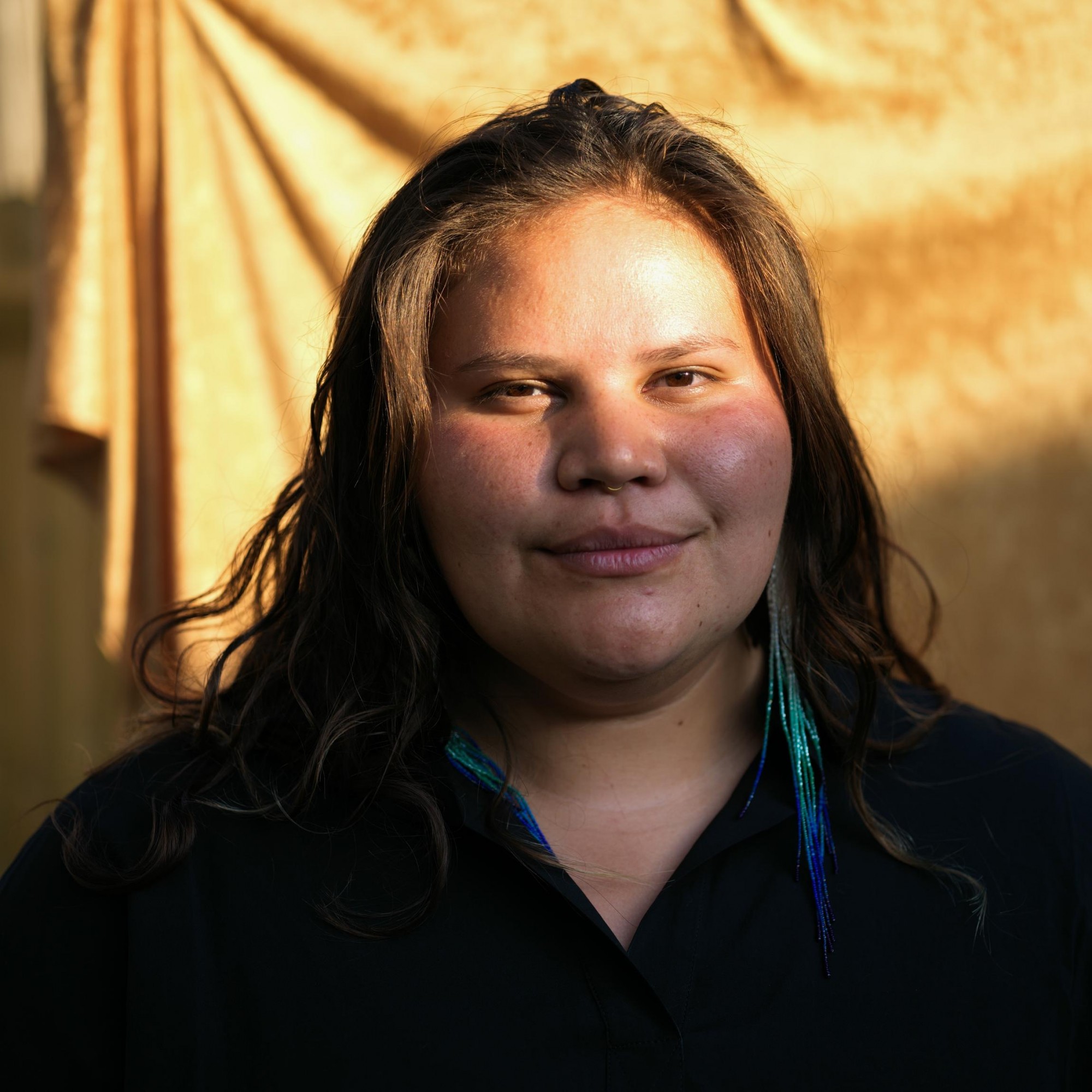
Delaney Keshena (Menomini) is a moccasin maker and fine artist born to a train-bound border town in sleepy, north-central Wisconsin. Keshena has studied at the Institute of American Indian Arts and uses hair, skin, and glass in their practice of crafting objects in relation with the body. Their work has been shown in Italy, Belgium, and throughout the United States.
Cohort V (2021-2023)
Laura Brown
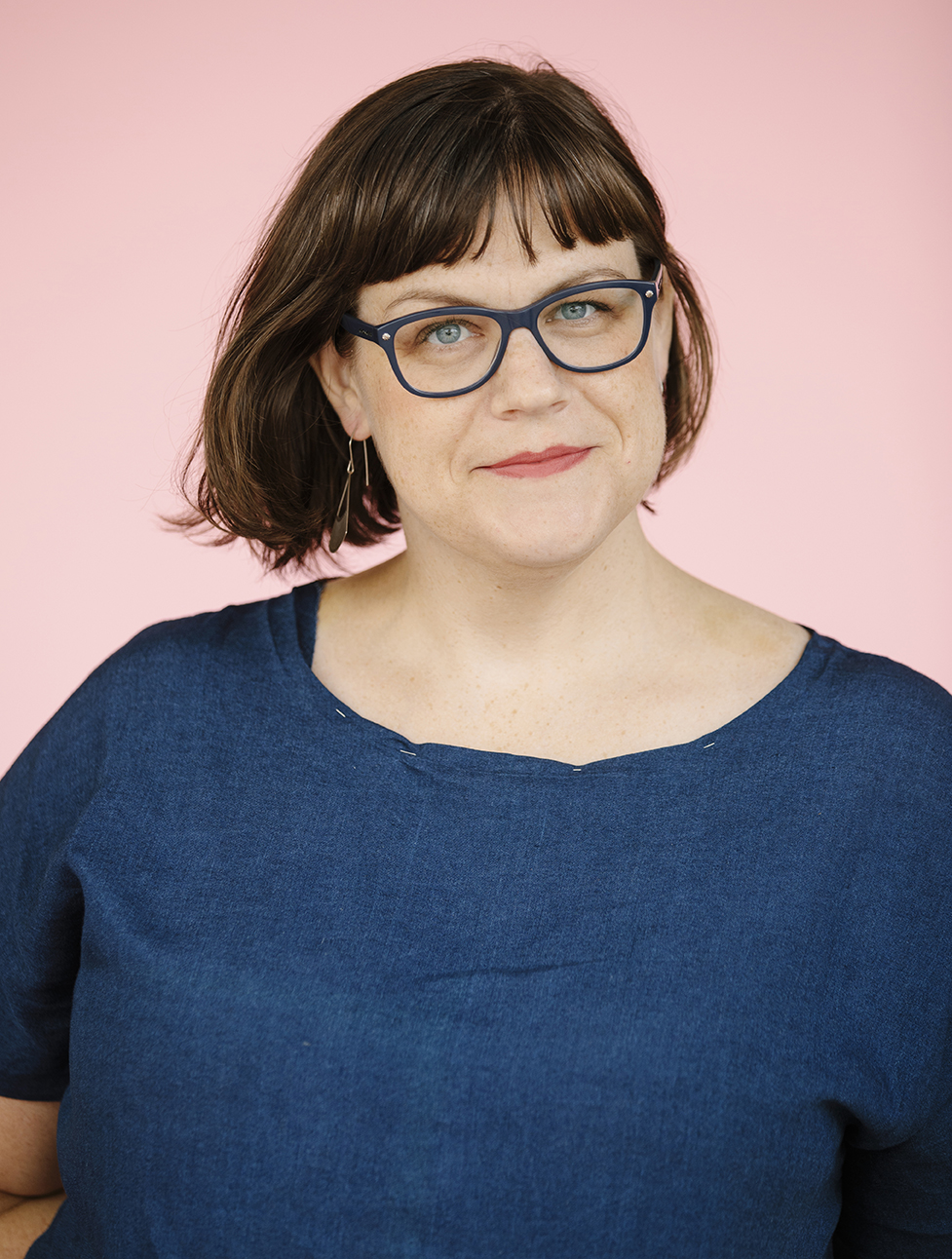
Laura Brown is an artist interested in color, process, imagination, and repetitive, labor-intensive tasks. She grew up in the rural high desert of southwestern Colorado and the northwoods of Wisconsin, and hails from a maternal lineage of professional and home sewists. Her work includes printmaking, installation, book arts, and textiles. As part of the Artisan Development Program, she continues to expand her quilting knowledge and practice, including the use of natural dyes from local foraged plants.
Laura Brown is an artist interested in color, process, imagination, and repetitive, labor-intensive tasks. She grew up in the rural high desert of southwestern Colorado and the northwoods of Wisconsin, and hails from a maternal lineage of professional and home sewists. As a child, she learned to sew, cook, and decorate cakes in her local 4-H club, and wrote stories and kept copious scrapbooks in her spare time. These interests led her to pursue a formal studio art education, where the discovery of printmaking and book arts as disciplines made perfect sense for her love of both language and image. She continued to sew, and found delight in creating quilts, which she thinks of as collages made from fabric. These days, her work includes printmaking, installation, book arts, and textiles. At North House, she continues to expand her quilting knowledge and practice, including the use of natural dyes from local foraged plants.
Laura holds an MFA in Studio Art from University of Texas at Austin. She has participated in residencies at the Myren Graffikk in Kristiansand, Norway; the Kala Art Institute in Berkeley, California; Minnesota Center for Book Arts in Minneapolis, Minnesota; and the Women’s Studio Workshop in Rosendale, New York. Her work appears in collections at Yale University and the Library of Congress, among others.
Nathan White
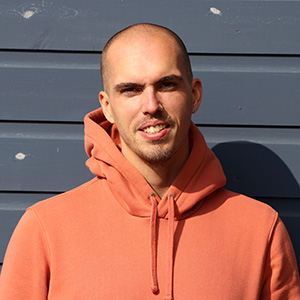
Nathan White was born in Milwaukee, WI, and moved to Minneapolis in 2009. Through his interest in sculpture, he started carving spoons; which in turn, inspired him to pursue woodworking. His first stop of that pursuit was apprenticing at the Carpenter’s Boat Shop in Pemaquid, ME. While there, Nate lived in community with his instructors and other apprentices as they learned boat building fundamentals building and restoring skiffs, peapods, dinghies, and other smaller boats and vessels. After his apprenticeship, he stayed in Maine and worked with one of his former instructors building a house and living off grid. During his time in Maine, he was introduced to many aspects of craft such as green woodworking, and is where he first learned to turn bowls on a lathe. Following that, he went back and forth between Minnesota to work at a wooden boat restoration shop, and Maine to work as a timber framer. In 2016 he was a recipient of the Folk and Traditional Art Grant from the Minnesota States Arts Board to study traditional wooden bowls of Scandinavia. Nate received an Artist Initiative Grant also from the MSAB in 2019, and in the spring of 2021, did his first residency at Anderson Ranch in Snowmass Village, CO.
With his time in the Artisan Development Program, Nate is looking forward to his first opportunities to teach, learn to cross country ski, and to build on the skills he already has while learning new ones along the way.
Cohort IV (2020-2022)
Emily Derke
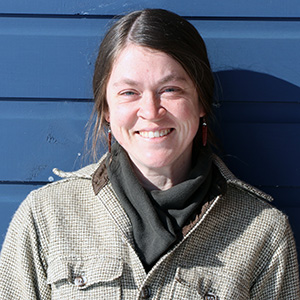
Northern Minnesota is where Emily calls home. The materials growing in the area are of great influence in Emily’s work. Primarily a basketmaker, She works with willow, birch bark, cedar bark, and other local materials to create useful items. Emily has spent time learning basketry in folk school settings, apprenticeships, workshops, and dedicated time practicing independently over the last 10 years. Teaching has been a main focus of her work. The desire to connect with people while creating and working with the materials that grow around us has inspired Emily to continue learning more about the materials and place we live.
Basketry continues to be the main focus of Emily’s work, but she also spends a great deal of time working to harvest and grow food, exploring the land around her, sewing, tanning hides and furs, and continuing to work towards living in a way that connects her to the things we need, use and eat.
As a current Artisan Development Program participant, Emily is looking forward to diving deep into the world of basketry traditions, exploring other crafts related to life in Northern Minnesota, and working on teaching these important crafts.
Christine Novotny
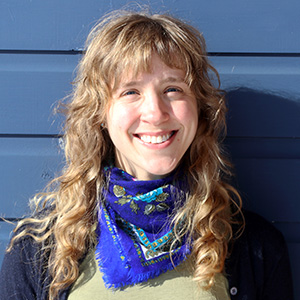
Christine Novotny is a handweaver with a love for color, pattern, and design. Christine has spent most of her life painting and drawing, capturing memory and her love for the natural world through imaginative, colorful paintings. After many years of creating work that either went up on a wall or into her flat file portfolio, she became frustrated with the lack of physical interaction between the work and the viewer. She longed to create work that was accessible, functional, tactile, and beautiful. Christine took a floor loom weaving class in 2014, thinking she would transfer the imagery in her paintings into tapestry weaving. Instead, she instantly fell in love with the precise, methodical, and attention-demanding process of creating textiles on a floor loom.
Christine has gone onto weave rugs (paintings you can step inside!), scarves, table linens, and wall art, all guided by her love for surprising color and design interactions. She enjoys manipulating the proportions and repetitions of old weaving drafts from around the world to create work that feels rich and contemporary, but still rooted in tradition. Christine firmly believes in the power of attention and slowing down, two fundamental skills in creating woven work.
Christine is thrilled to be an Artisan in Residence at North House—to have time and support to create new textiles, challenge herself to learn new skills, and gain the professional tools necessary to support a life in art and craft.
Cohort III (2019-2021)
Josh Tolkan
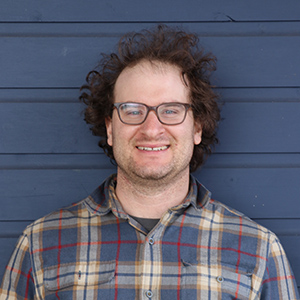
Josh spent his youth paddling rivers of Northern Wisconsin and sailing on Lake Michigan. While attending Carleton College he began paddling Minnesota’s Boundary Waters and sailing the midwest collegiate racing circuit. After spending a summer teaching sailing at the Center for Wooden Boats in Seattle, he became a hobby boat builder. During seven years spent as an affordable housing project and construction manager he built a cedar strip canoe, a nutshell pram and remodeled an RV trailer into a mobile kitchen. Finally Josh decided he had had his fill of management life and needed to be using his hands on a daily basis. In 2016 he enrolled at the Northwest School of Wooden Boat Building near Port Townsend, Washington. His year of school culminated in a third place finish for his team at the Port Townsend Wooden Boat Festival’s 3 day Boat Building Challenge! In the fall of 2017 he went to work for Wilderness Inquiry in Minneapolis, Minnesota. There he redesigned and prototyped Wilderness Inquiry’s 24′ Voyaguer canoe and then helped Wenonah Canoe prepare to mass produce that design for Wilderness Inquiry.
Elise Kyllo
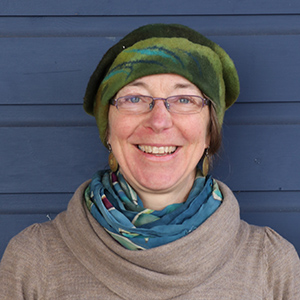
Elise Kyllo grew up in South Minneapolis but immediately after college discovered a love for the wilderness while guiding BWCA trips from the end of the Gunflint Trail. This experience ultimately led her back to Grand Marais and to North House Folk School after many years of farming, urban gardening, being an environmental educator and artist. Somewhere along the way, wool as an artistic medium entered her life and replaced the paints, clay and inks with a desire to create things of beauty and usefulness with wool. “It’s somewhat of a mystery as to how I fell in love with wool, but undoubtedly it’s the close connection to the land, the sustainability of fiber from sheep, from grass and sun, magically transforming wool into an endless list of things with just water, soap and patient agitation. Felting with wool is completely intoxicating and never, ever dull.”
Teaching felting at North House Folk School has allowed Elise to merge her passion for teaching, art, creativity and living simply. North House created a path back to the north shore, which has led to the building of a house, growing a north woods garden and now the Artisan Development Program. For the first time, Elise had a studio space and was able to focus on developing her felting and teaching skills, work with felting mentors, dig deeper into understanding numerous breeds of sheep and practice the nuances of being a working craftsperson/artist.
Cohort II (2018-2020)
Mike Loeffler
Mike Loeffler is a wood worker inspired by natural forms and embellished wooden folk art. Although he was always fascinated with wood, he had the opportunity to explore craft through an internship at North House in 2011. His last name, Loeffler, is a German occupational name given to spoon makers in the middle ages. This made spoons a meaningful entry point to the world of craft. After a stint of farm jobs he worked as carpenter in the Twin Cities continuing to pursue his woodworking passions on the side. Recently, Mike has been exploring fågelskålar (bird shaped ale bowls), small furniture design, as well as some traditional building techniques. With the support of a Minnesota State Arts Board grant in 2017, he was able to study and build a number of grindbygg timber frames with North House instructor Peter Henrikson. Visit Mike's website.
Marybeth Garmoe
Marybeth was born in the Midwest and spent her childhood summers exploring the forests and lakes of Northern Wisconsin, poking under logs, crafting things for play from found grapevines and bark pieces, and sneaking occasional snacks on wild onions or young dandelion leaves when her parents weren't looking. After studying Ecology and Forestry, she held multiple jobs working in remote backcountry settings and with people who had strong ties to the land and rich cultural histories and traditions inspired by those landscapes. Those experiences, combined with multiple folk school internships, influenced Marybeth to delve more deeply into the world of traditional craft. After gaining years of experience turning wood, carving spoons and tying broomcorn brooms, she went rogue, quit her job, and started making her living and lifestyle by selling her hand-crafts, teaching and harvesting wild foods. She is continually inspired by the idea of living in harmony with the seasons - growing, crafting and harvesting most of what she needs and limiting consumerism to what is necessary and affordable. Visit Marybeth's website.
Cohort I (2017-2019)
Angela Robins
Angela Robins is a woodworker and educator, inspired by the curved forms found in Scandinavian and Japanese wooden crafts, in particular the boat and bowl. Raised in the U.S. and Japan, her interest in traditional crafts was sparked from seeing images of wooden Japanese fishing boats. After the 2011 earthquake and tsunami of northeastern Japan, she returned to her hometown and visited with traditional craftspeople in the region. Her first opportunity to study traditional woodworking and crafts was at North House Folk School, where she was an intern in 2013. Since then she taught skin on frame wooden boatbuilding at a youth development program, Urban Boatbuilders, for three years, and continues to teach the ancient textile technique, nålbinding, to students of all ages. In 2015 she received a Minnesota Folk & Traditional Arts Grant to study Scandinavian green wooden bowl turning with Jim Sannerud. In the spring of 2015, she assisted boatbuilder and researcher Douglas Brooks with the documentation and building of a traditional wooden fishing boat with one of the last boatbuilders in northeastern Japan. As a participant in the Artisan Development Program, she will focus primarily on her wooden bowl turning and carving practice. Visit Angela’s website.
